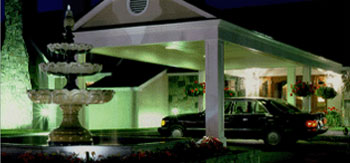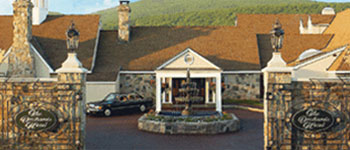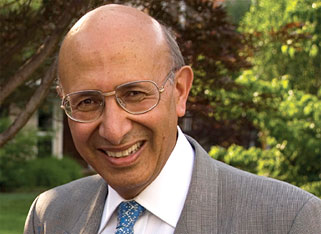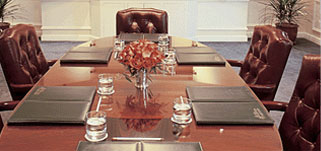ONE WINTRY MORNING A FEW YEARS AGO, a couple walked across the parking lot of The Orchards Hotel toward their car. A man was scraping snow and ice off a late-model Mercedes-Benz; when he saw the couple approach a nearby car he rushed over and began to brush the snow from their windshield. Assuming that this windshield-wiper was a hotel employee, the husband handed him a tip, which the man adamantly refused. "You don't understand," objected the snow-clearer, pointing his ice-scraper at the Mercedes. "That's my car."
The husband quickly withdrew his tip, and the couple left without learning the identity of the helpful Mercedes-owner, who instead could have pointed at the front door and said: "That's my hotel." But that's not Sayed Saleh's style. His is more the understated act of courtesy: gracious, conscientious, and considerate without the dramatic flourish. It is this style that reigns at The Orchards, Saleh's small, independent hotel nestled in the hills of Williamstown, Massachusetts.
The Caretaker
Innkeeper Sayed Saleh invests The Orchards with international flavor and Old World elegance
Innkeeper Sayed Saleh invests The Orchards with international flavor and Old World elegance

I"I fell in love at first sight," Saleh says, recalling his initial reaction to The Orchards. He pauses to enjoy a sip of Veuve Clicquot champagne, while at the same time keeping a watchful eye on his wait staff's every move. What he calls the property's English feel-its antique furnishings and peaceful courtyard, a harmonious landscape of vibrant plantings, pond, and fountain-left a lasting impression that lingered long after his first visit in 1992.
Castle of freedom
Born in Cairo, Egypt, and raised in Lebanon, where his father was a university professor of mathematics, Saleh was leaning toward a career in academia when he caught the tourism bug. "During the1960s, tourism was growing in Egypt," he recounts. "One of the managers of a hotel in Cairo was talking about how the business was very exciting. I had a group of close friends and we thought it sounded interesting..." They all decided to pursue careers in this burgeoning industry.
Saleh received his hospitality industry training in England and gained professional hotel and restaurant management experience throughout Europe, spending a good deal of time in London, Paris, Rome, Frankfurt, Hamburg, and Stuttgart. However, in the back of his mind, he wanted to live and work in the United States. "The States has always been part of my dream," explains the elegant hotelier, his double-breasted jacket accented with a sharp blue tie and coordinating pocket square. "Since my father was at American University in Lebanon, we were aware of the U.S.; it was always part of our consciousness. My father called it, 'The last castle of freedom.'" While visiting a friend in the U.S., Saleh decided to act on his dream: "I went back to England. My mind was made up; I was going to the States."
In the 1970s, he did just that, moving to Boston to manage the 285-room Colonnade Hotel. There he worked closely with then-Governor Michael Dukakis and other leaders of the state's hospitality industry to establish the Massachusetts Office of Travel and Tourism and enhance the Commonwealth's appeal as a popular destination for domestic and international travelers. He also met and married his wife, Maggie, an administrative assistant at the hotel. "It was against the rules," he chuckles, "but I'm glad we broke the rules."
Saleh received his hospitality industry training in England and gained professional hotel and restaurant management experience throughout Europe, spending a good deal of time in London, Paris, Rome, Frankfurt, Hamburg, and Stuttgart. However, in the back of his mind, he wanted to live and work in the United States. "The States has always been part of my dream," explains the elegant hotelier, his double-breasted jacket accented with a sharp blue tie and coordinating pocket square. "Since my father was at American University in Lebanon, we were aware of the U.S.; it was always part of our consciousness. My father called it, 'The last castle of freedom.'" While visiting a friend in the U.S., Saleh decided to act on his dream: "I went back to England. My mind was made up; I was going to the States."
In the 1970s, he did just that, moving to Boston to manage the 285-room Colonnade Hotel. There he worked closely with then-Governor Michael Dukakis and other leaders of the state's hospitality industry to establish the Massachusetts Office of Travel and Tourism and enhance the Commonwealth's appeal as a popular destination for domestic and international travelers. He also met and married his wife, Maggie, an administrative assistant at the hotel. "It was against the rules," he chuckles, "but I'm glad we broke the rules."
That’s what I want
While based in Boston, Saleh frequently visited the Berkshires to attend Tanglewood, but only ventured north after a friend told him about Williamstown. "I thought he was talking about Williamsburg," he laughs. He fell under the sway of the bucolic town's cultural riches: The Clark, Williams College, and the Williamstown Theatre Festival. But it was The Orchards Hotel that stuck in his mind. Built in 1985, the hotel rests on property that was part of the 240-acre Homestead Farm-founded in 1765 by Nehemiah Smedley, one of Williamstown's earliest settlers-the site of the town's first orchard. Saleh was en route to a travel industry event in China in 1993 when he learned the property was for sale. "I heard it was on the market and I said, 'That's what I want.' I made the deal when I came back. I could envision the future and what the hotel could be."

To realize his vision, Saleh enlisted the aid of William Caligari Interiors/Architecture of Great Barrington, Massachusetts. "Someone from my office pestered him until he finally gave us a project just to get us off his back," recalls Caligari. Initially hired to enhance the hotel's corridors, Caligari eventually completed a three-year, multi-million-dollar renovation, including installation of a stone facade and fountain to improve the hotel's entrance and redecorating the forty-nine rooms and suites-each of which is unique and about one-third larger than the average hotel room-for a more gracious, Old World feel. When a pipe burst in the dining room, causing the ceiling to collapse, Saleh took the opportunity to have Caligari redo the hotel's jewel-toned dining room, Yasmin's Restaurant.
Caligari was impressed with Saleh's insistence on using the highest-quality materials: gold-patterned German upholstery on the walls backed with sound-absorbing batting; costly Exminster carpet from England, not only in the public spaces but also in the rooms; Italian light fixtures; solid walnut pilasters; ornate moldings and cornices; antique furnishings. "He's a fairly formal individual," says Caligari, explaining the hotel's traditional, rich decor. "The intent wasn't to be hip. The intent was to be more staid."
Caligari also admires the hotelier's hands-on style. After Saleh and his wife, Maggie, approved designs, "He did all the procurement in-house, which is a major project," says Caligari, with a bit of awe. Saleh acted as general contractor, executing the design without watering it down. He even set up a carpentry shop in the hotel's basement, hiring a full-time woodworker to build columns, shelving, and any other decorative touches. "He was really a pleasure as a client because he was so open about what we wanted to do, and he would do it," says Caligari. "It's a big decision. He really understood it, and he had the conviction and nerve to follow through." Saleh believes his guests notice the details: "When they leave, they realize there is something special, something exceptional here."
Caligari was impressed with Saleh's insistence on using the highest-quality materials: gold-patterned German upholstery on the walls backed with sound-absorbing batting; costly Exminster carpet from England, not only in the public spaces but also in the rooms; Italian light fixtures; solid walnut pilasters; ornate moldings and cornices; antique furnishings. "He's a fairly formal individual," says Caligari, explaining the hotel's traditional, rich decor. "The intent wasn't to be hip. The intent was to be more staid."
Caligari also admires the hotelier's hands-on style. After Saleh and his wife, Maggie, approved designs, "He did all the procurement in-house, which is a major project," says Caligari, with a bit of awe. Saleh acted as general contractor, executing the design without watering it down. He even set up a carpentry shop in the hotel's basement, hiring a full-time woodworker to build columns, shelving, and any other decorative touches. "He was really a pleasure as a client because he was so open about what we wanted to do, and he would do it," says Caligari. "It's a big decision. He really understood it, and he had the conviction and nerve to follow through." Saleh believes his guests notice the details: "When they leave, they realize there is something special, something exceptional here."

According to Caligari, the renovations were necessary to upgrade the facility to match the high level of service that Saleh has instilled at The Orchards. That service is delivered by an international team of employees who come to Williamstown from all across Europe to attain overseas experience, recruited from institutions such as the Swiss School of Hotel and Tourism Management in Chur, Switzerland; American College of Management & Technology in Croatia; Glasgow Caledonian University in Scotland; and Galway-Mayo Institute of Technology in Ireland. Saleh, who speaks four languages-Arabic, English, French, and German-and lives with his wife in the hotel, is an ever-present teacher and role model, providing subtle direction to the staff in a somewhat avuncular, impeccably polite manner. He also maintains an extensive multimedia library to foster staff education in all aspects of the hospitality industry.
A culinary destination
Thomas Brinkrolf, a young German who currently serves as the hotel's head bartender and waiter, arrived last May having previously apprenticed in much larger hotels in Austria and Ireland. The smaller scale of The Orchards enables him to gain valuable exposure to all facets of hotel operations. "Over here, you have to do basically everything," he explains. "If there is a hand needed with the dishwasher, then you wash dishes. This is a good way to see how everyone at the hotel is working." From observing Saleh's commitment to answering the needs of his guests-no matter how unfeasible they seem-Brinkrolf has absorbed a valuable lesson he'll take back to Europe when his work visa expires in November: "Nothing is impossible when everybody works together."

Until recently, Saleh participated in an exchange program among international hotels, which rotated chefs through Yasmins kitchen every two years. That stopped when Swen Boehm, a master chef from Germany, arrived in 2003. Now thirty-three years old, chef Boehm creates exquisitely plated compositions of intense flavors and intriguing textures, relying heavily on local ingredients. With Bochm at the stove, Yasmin's has garnered raves from U.S. and international reviewers. Just this winter, Italy's Sky TV program Le Vie d'Acqua included The Orchards in a tour of New England's luxury inns and hotels, awarding Yasmin's its top rating. Quarterly Review of Wines lauded Yasmin's as "a culinary destination," and the restaurant has also earned notice from Gourmet magazine, Forbes, and the Financial Times.
Saleh's personal and professional commitment to satisfying his guests with plush accommodations, exceptional food and wine, and gracious service has earned him "2003 Hotelier of the Year" by Preferred Hotels & Resorts, and The Orchards, a member of the Leading Small Hotels of the World, maintains a four-diamond rating from AAA. And his hospitality extends beyond paying customers. Caligari recounts that during renovations, "I was probably up there three to four times per week. He'd never let me leave without lunch or dinner." With Saleh, that meant a multi-course meal accompanied by complementary wines.
Saleh's personal and professional commitment to satisfying his guests with plush accommodations, exceptional food and wine, and gracious service has earned him "2003 Hotelier of the Year" by Preferred Hotels & Resorts, and The Orchards, a member of the Leading Small Hotels of the World, maintains a four-diamond rating from AAA. And his hospitality extends beyond paying customers. Caligari recounts that during renovations, "I was probably up there three to four times per week. He'd never let me leave without lunch or dinner." With Saleh, that meant a multi-course meal accompanied by complementary wines.
I'm glad they kept you
This impulse toward generosity and hospitality stems from a deep-rooted philosophy: Saleh believes in international tourism as a vehicle of world peace, positing that firsthand cross-cultural experience can help allay conflict. This past March, Saleh was named president of the Boston branch of Skal International, an organization formed in 1934 to promote global goodwill and friendship through travel. Like his staff, Saleh attracts visitors from around the world; The Orchards has been the unlikely site of meetings of both the Swiss National Tourist Board and the Hong Kong Chamber of Commerce. And, after stalling in the wake of 9/11, international bookings have rebounded to about 10 percent of business.
Saleh aims to attract more guests from abroad-and not only to promote understanding among nations. "The international business is a very lucrative business," he explains. "International travelers tend to stay longer and spend more." He also generates a high percentage of repeat visitors; due to his active role in the hotel, it's inevitable that many of these regulars have become friends. Says Saleh, "There are a lot of personal relationships involved in creating this kind of business." Behind this professional acumen, it's easy to sense the personal satisfaction he derives from treating his guests with warmth and consideration, in doing everything he can to make them feel at home.
One summer morning a few years ago, Sayed Saleh stood at the edge of the courtyard pond, feeding the ducks who return to The Orchards each year to bring new ducklings into the world. An older woman-also a returning guest-sidled up to Saleh and mentioned that she had heard that the hotel had been sold. Saleh confirmed that it was true. Patting him on the arm, she said, "Well, I'm glad they kept you."
Saleh aims to attract more guests from abroad-and not only to promote understanding among nations. "The international business is a very lucrative business," he explains. "International travelers tend to stay longer and spend more." He also generates a high percentage of repeat visitors; due to his active role in the hotel, it's inevitable that many of these regulars have become friends. Says Saleh, "There are a lot of personal relationships involved in creating this kind of business." Behind this professional acumen, it's easy to sense the personal satisfaction he derives from treating his guests with warmth and consideration, in doing everything he can to make them feel at home.
One summer morning a few years ago, Sayed Saleh stood at the edge of the courtyard pond, feeding the ducks who return to The Orchards each year to bring new ducklings into the world. An older woman-also a returning guest-sidled up to Saleh and mentioned that she had heard that the hotel had been sold. Saleh confirmed that it was true. Patting him on the arm, she said, "Well, I'm glad they kept you."